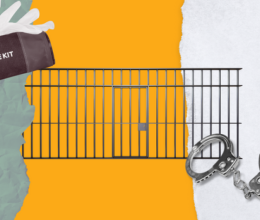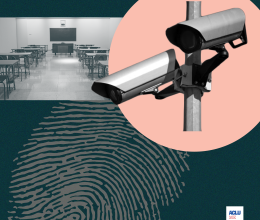FOR IMMEDIATE RELEASE
AUGUSTA – Under two new Maine laws, law enforcement must get a warrant based on probable cause before accessing an individual’s cell phone records or placing a camera on an individual's property. The ACLU of Maine applauded the legislature for these important steps to protect the privacy of Mainers in the face of advancing technology. Unfortunately, Governor LePage vetoed two other bills to protect privacy that had the support of the House and Senate. The governor has said he will issue an Executive Order directing the Commissioner of Public Safety to establish guidelines surrounding the use of drones.
"The Constitution doesn't safeguard privacy under some technologies but not under others, and it certainly doesn't say that guidelines are a sufficient replacement for warrants,” said Shenna Bellows, executive director of the ACLU of Maine. “Drone surveillance and geolocation tracking are just as potentially invasive of people's privacy as traditional camera and cell phone surveillance. The governor made a false distinction by accepting two of these privacy bills and vetoing two. Fifty percent isn't good enough when it comes to people's civil liberties."
LD 1377, "An Act to Protect Cellular Telephone Privacy," sponsored by Senator Roger Katz (R-Augusta), became law at midnight after Gov. LePage took no action on the bill, which easily passed in the Senate and the House. LD 1040, "An Act To Prohibit the Placement of Cameras and Electronic Surveillance Equipment on Private Property without the Written Permission of the Landowner," sponsored by Senator Doug Thomas (R-Ripley), became law without the Governor's signature on June 29.
Also yesterday, Gov. LePage vetoed LD 415, "An Act To Require a Warrant To Obtain the Location Information of a Cell Phone or Other Electronic Device," sponsored by Senator Katz, and LD 236, "An Act To Protect the Privacy of Citizens from Domestic Unmanned Aerial Vehicle Use," sponsored by Senator John Patrick (D-Rumford), which would require warrants for cell phone tracking and drone surveillance, respectively.
The legislature has an opportunity today to override those vetoes. Both bills under consideration before the legislature today were amended significantly from original versions in the committee process to satisfy concerns expressed by stakeholders and even the Governor's office.
"Given recent wide-ranging abuses of American privacy, the legislature should be applauded for voting time and time again to require state and local law enforcement to get a warrant before spying on Mainers,” said Shenna Bellows, executive director of the ACLU of Maine. “The legislature should redouble its commitment to bringing our privacy laws up to speed, and vote to override the vetoes on LDs 415 and 236. As technology advances, Maine's police practices must remain in line with the Constitution."
Maine Enacts Privacy Legislation For Cell Phones and Cameras
Related Issues
Related content

Memo: Trump on Surveillance, Protest, and Free Speech
November 13, 2024
DHS Focus on "Soft Targets" Risks Out-of-Control Surveillance
October 24, 2024
How Trump's Proposed Radical Expansion of Executive Power Will...
July 11, 2024
My Family Business Depends on Digital Ads. And I Support...
April 17, 2024
Maine Lawmakers Reject So-Called Privacy Bill Backed by Big Tech
April 17, 2024
I'm a Tech Founder. You Can Trust Me When I Tell You Maine Needs...
April 9, 2024
How to Protect Consumer Privacy and Free Speech
March 19, 2024
We're Urging Lawmakers to Oppose a Bill that Would Ban Property...
February 21, 2024

